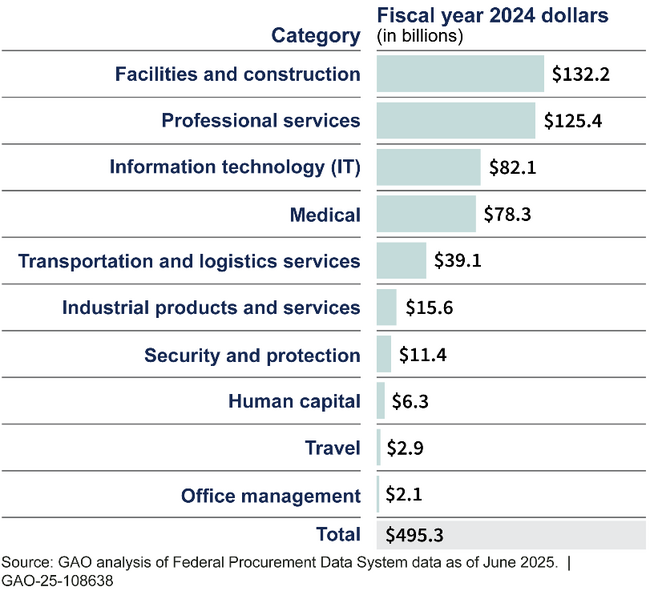Government Contracting: Leveraging Federal Buying Power Can Save Billions
Highlights
In fiscal year 2024, federal agencies spent more than $495 billion on common products and services like medical supplies and information technology (IT). For more than 2 decades, we have recommended ways for agencies to strategically manage their spending, which has resulted in billions in savings.
The Big Picture
Since 2014, the Office of Management and Budget (OMB), with support from the General Services Administration (GSA), has led the category management initiative. Category management is intended to help federal agencies buy like a single enterprise to leverage the government’s buying power, eliminate duplicative contracts, and save taxpayer dollars. OMB reported that the government has saved more than $111 billion since starting the initiative.
The initiative established 10 common spending categories, which account for more than half of federal contract spending. It also established government-wide contracts that offer competitive pricing and provide increased visibility into data to inform buying strategies.
Ten Common Spending Categories

Note: The category dollar amounts may not sum to the total due to rounding.
In March 2025, the President issued an executive order to further centralize agencies’ buying efforts to eliminate waste and enable agencies to focus on their core missions. In July 2025, OMB issued guidance for agencies to consolidate spending through contracts managed by GSA using category management principles, and to centralize agency procurement functions at GSA, where appropriate. OMB recently noted that less than 20 percent of common spending currently goes through GSA.
What GAO’s Work Shows
Our work has shown that leading private sector companies use category management to manage up to 90 percent of their purchases and achieve savings of 10 to 20 percent of total procurement costs. We also found that agencies have faced challenges implementing category management, leaving billions of dollars in potential savings on the table. We made recommendations in key areas to increase savings.
Accountability Facilitates Results
We found that to achieve results, agencies need to be held accountable.
- In October 2016, we found that previous efforts to consolidate spending missed opportunities for savings because agencies underutilized preferred contracts, and OMB did not monitor agency use or hold agencies accountable for results. In response to our recommendations, OMB established goals including the amount of spending managed using category management principles, use of preferred contracts, savings, and small business utilization. Subsequently, OMB issued overarching guidance in 2019 that directed agencies to take five key actions, including establishing annual plans to manage more spending using category management principles while also balancing their small business goals.
- In November 2020, we found that small businesses had received at least 30 percent of annual category management obligations since 2016, but the number of small business vendors providing common products and services decreased each year, continuing a decade-long trend. OMB has since offered new training to identify small business opportunities and improved its reporting metrics.
- In September 2025, we reported that the Department of Veterans Affairs (VA) had issued relevant policy, but its category managers—who have responsibility for implementing category management—generally did not fulfill their responsibilities. We recommended that VA establish performance requirements and take other steps to hold category managers accountable.
Better Data Could Yield Future Savings
Our work has consistently found that agency limitations in collecting, analyzing, and sharing data have hindered category management implementation.
- In September 2020, we found that three of seven agencies we assessed did not regularly review their spending on IT contracts to identify potential contract duplication or share contract data such as the prices they paid for IT products and services.
- In November 2020, we found that agencies reported numerous data challenges, but OMB had not pursued government-wide solutions to address them. We recommended that OMB establish a strategic plan to address data challenges. In January 2025, OMB reported that an initiative to improve access to centralized data was underway.
Focus on Requirements Needed
Defining requirements is a key step that agencies should take to understand what products and services they need before deciding how to buy them.
- In October 2016, we reported on OMB efforts to standardize computer configurations for common requirements. An interagency working group of requirements and contracting officials found that agencies bought hundreds of different types of computers, but that nearly 80 percent of requirements could be met through five standard configurations. OMB developed a strategy to standardize configurations and consolidate purchasing.
- In November 2020, we found that OMB’s overarching guidance focused primarily on contracting, not how agencies can better define requirements. We recommended that OMB increase its emphasis on requirements and develop more tailored training for relevant officials. OMB has since amended its guidance and developed some training to emphasize the importance of engaging with stakeholders responsible for defining requirements.
Challenges and Opportunities
Our prior work identified key challenges and opportunities for OMB, GSA, and federal agencies to improve category management implementation and realize greater efficiency and savings. Current efforts led by OMB and GSA have the potential to advance category management by providing the tools, training, and expertise needed to drive more spending through government-wide contracts while also ensuring agencies meet their statutory small business contracting goals, address data limitations, and better define requirements.
Efforts to centralize procurement functions previously carried out by agencies will require close collaboration and well-defined agreements to ensure that GSA is meeting agency expectations and mission requirements while achieving results like cost savings and shorter procurement lead times. OMB’s July 2025 guidance acknowledges the need to consider how GSA will increase its capacity to support these efforts, as well as develop processes to manage risk and monitor performance.
Congressional oversight of these efforts—and a sustained focus on accountability, data, and requirements—has the potential to help federal agencies accomplish their missions more effectively while also achieving savings and being better stewards of taxpayer dollars.
For more information, contact Mona Sehgal at SehgalM@gao.gov.
